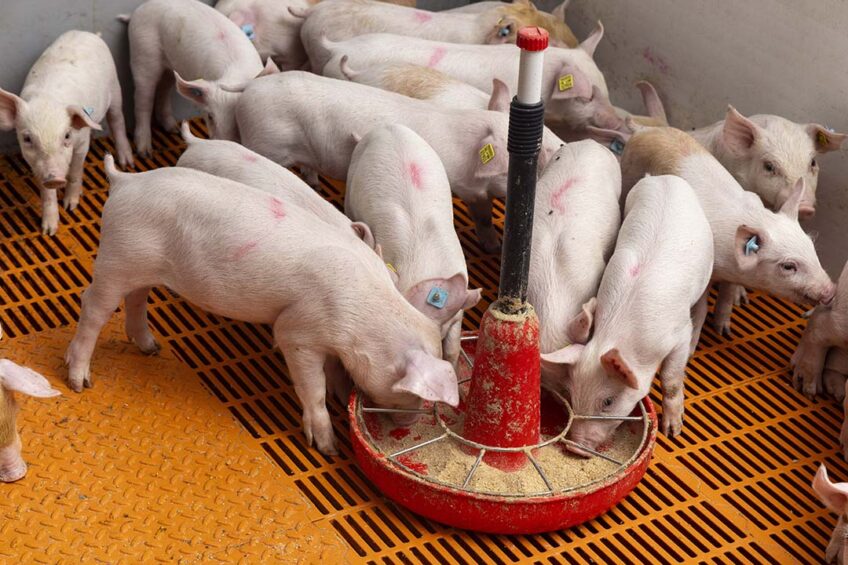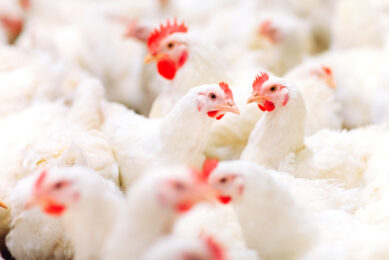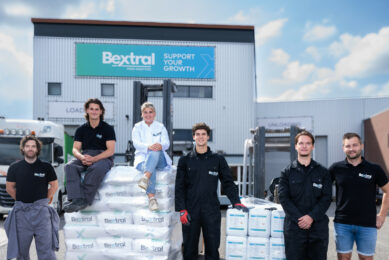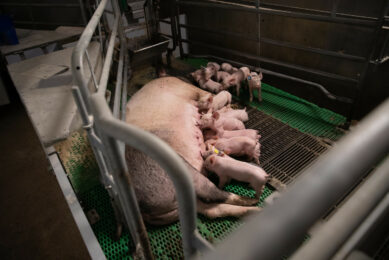Piglet diarrhoea: Can amino acid supplementation help?

Post-weaning diarrhoea is a significant health issue in piglets resulting in substantial economic loss in the pig industry. It has been shown that amino acid supplementation can prevent or reduce the incidence of post-weaning diarrhoea in piglets. This article provides an overview of the commonly used amino acids in pig diets and their impact on piglet diarrhoea.
The transition from easily digestible liquid milk to more complex, less digestible solid feed alters gut morphology, induces inflammatory responses, and often leads to diarrhoea. Excessive dietary protein levels in post-weaning piglet diets cause a higher incidence of diarrhoea. Thus, managing dietary protein levels and composition can effectively treat diarrhoea and reduce faecal output.
Glutamine
Dietary glutamine is the primary fuel for piglets’ gut cells, providing substrates for the synthesis of nucleotides, cell proliferation, gene expression, and cell growth and renewal. Furthermore, glutamine exerts beneficial effects countering gut epithelial cell impairment and oxidative stress in post-weaning piglets. Glutamine improves gut permeability and electroneutral sodium chloride absorption and increases tight junction protein expression in the gut of piglets experiencing weaning stress. Glutamine protects the host from bacterial invasion by inhibiting bacterial adherence to gut epithelial cells, thus preventing diarrhoea. Research has shown that 1.0% glutamine supplementation reduces diarrhoea prevalence and duration in post-weaning piglets.
Branched-chain amino acids
Branched-chain amino acids including leucine, isoleucine, and valine are a source of energy for gut cell proliferation and nutrient transport. In addition, branched-chain amino acids maintain gut barrier function and improve gut morphology by increasing villus height. Furthermore, branched-chain amino acids serve as signal molecules in pathways that regulate protein turnover, lipid and glucose metabolism, redox balance and immune defences. Branched-chain amino acids upregulate the expression of sodium glucose co-transportation in the piglet gut and improve gut microbiota composition, thus reducing diarrhoea.
Aromatic amino acids
Increased dietary levels of aromatic amino acids including phenylalanine, tryptophan and tyrosine prevent an inflammatory immune response in the piglet gut and reduce the incidence of diarrhoea. Tryptophan, a nutritionally essential amino acid, alleviates inflammation, endoplasmic reticulum stress and programmed cell death, improves gut morphology and integrity, and reduces the diarrhoea rate and index in post-weaning piglets. In addition, tryptophan improves gut function by increasing the expression of tight junction protein. Research has shown that combined supplementation of tryptophan and threonine decreases the time during which the use of an antibiotic was required to prevent diarrhoea in post-weaning piglets.
Arginine
Dietary supplementation with arginine increases nitric oxide production, maintains water and electrolyte transport homeostasis, modulates gut function and reduces the occurrence of diarrhoea. In addition, arginine supplementation in piglet diets enhances feed intake and growth performance, improves gut morphology and mucosa development, increases villus height, and alleviates oxidative and inflammatory responses. Arginine is the main factor determining its effects on the incidence of diarrhoea because low nitric oxide levels stimulate the absorption of water and electrolyte, while high levels of nitric oxide cause the secretion of water and electrolyte.
Sulphur-containing amino acids
Sulphur-containing amino acids include methionine, cysteine, and theanine. Combined administration of cystine and theanine alleviates diarrhoea. Cysteine supplementation attenuates gut inflammation and improves mucosal barrier function and gut permeability in various inflammatory diseases.
Methionine is used as a substrate for the synthesis of taurine and glutathione to neutralise oxidative stress and maintain gut homeostasis. In addition, methionine supplementation maintains gut morphology, integrity and barrier function in both normal post-weaned piglets and intrauterine growth-retarded piglets. Moreover, methionine reduces paracellular permeability by targeting tumour necrosis factor alpha and clearing free radicals that induce gut inflammation and diarrhoea. Furthermore, dietary supplementation with liquid methionine hydroxy analogue-free acid in piglets increases the abundance of Lactobacillus spp. and decreases the abundance of E. coli in the rectum, thus exerting beneficial effects against diarrhoea. Importantly, an imbalanced dietary methionine to sulphur-containing amino acid ratio leads to gut villous atrophy. Therefore, when extra methionine is added to the diet, an adequate ratio of methionine to sulphur-containing amino acid should be considered to maintain gut health and prevent diarrhoea.
Glycine and serine
Glycine and serine are metabolically necessary for piglet development and for modulating their antioxidant capacity. Glycine improves gut function, paracellular permeability, mucosal immunity and energy status, and promotes protein synthesis. Furthermore, glycine alleviates inflammation, enhances tight junction protein expression and relieves programmed cell death. In addition, glycine maintains oxidative balance by eliminate ferroptosis, a form of non-apoptotic, iron-dependent cell death that causes intestinal injury. As a result, attenuated ferroptosis in piglets’ gut is accompanied by a lower incidence of diarrhoea. Dietary supplementation with 2% glycine reduces the abundance of pathogenic bacteria including Burkholderiales, Clostridium and Escherichia-Shigella. Serine improves growth performance and reduces the incidence of diarrhoea. In addition, serine improves gut health, alleviates oxidative stress and inhibits gut inflammation in piglets.
Lysine
Lysine is the first limiting amino acid, with an important role in protein synthesis and metabolic functions. Dietary lysine supplementation reduces inflammation and diarrhoeal morbidity, independent of its physiological roles. Lysine restriction leads to programmed cell death and affects gut microbial composition. However, whether these alterations in gut microbial composition are related to diarrhoea remains to be explored.
Threonine
Threonine is a limiting amino acid in the piglet diet, with an important role in gut development, maintenance of gut mucosal integrity and barrier function, and growth performance. Approximately, 60% of dietary threonine is used for the synthesis of gut mucosal proteins including mucins. Threonine deficiency increases the paracellular permeability, impairs gut integrity, lowers acidic mucin levels and leads to chronic diarrhoea.
Amino acids’ synergistic effects
Research studies have shown that combined supplementation of amino acids inhibits diarrhoea more effectively than single amino acid supplementation. Combined supplementation with arginine and glutamine improves villus development and reduces the incidence of diarrhoea in post-weaning piglets. Dietary supplementation with threonine and tryptophan together is an alternative approach to antibiotics to prevent diarrhoea. In addition, a low-dosage combination of leucine, arginine, tryptophan, isoleucine, valine and cystine reduces the incidence of diarrhoea in post-weaning piglets without affecting growth performance.
Concluding remarks
Amino acids improve gut integrity and permeability, alleviate morphological damage and inflammatory and oxidative stress, thus reducing the incidence of post-weaning diarrhoea. Many studies have evaluated the effects of single inclusion of dietary amino acids on gut health and diarrhoea. Therefore, future research is required to investigate the impact of combined supplementation with functional amino acids, considering the effect of their balance in the piglet diet on post-weaning diarrhoea.
Reference: Zhou X, Liang J, Xiong X, Yin Y. Amino acids in piglet diarrhea: Effects, mechanisms and insights. Anim Nutr. 2023 Oct 24;16:267-274.











